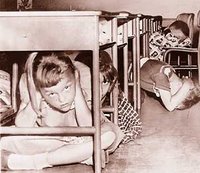Random Thoughts Department - We Are the Champions

I don’t know what it is like in the rest of the country, but in Chicago, St. Patrick’s Day is a week-long drunken affair. I believe that St. Paddy’s is the Irish’s revenge for being treated like shit when they first immigrated to America, when they couldn’t get jobs because they were considered “Roman” instead of European Caucasian.
My mother hated St. Patrick’s Day because she didn’t think it was fair that the Irish had their own holiday while all the other ethnic groups were left out in the cold. She didn’t think it was right that Chicago taxpayers footed the bill for Mayor Richard J. Daley’s annual St. Patrick’s Day Parade and forbade us from wearing green to school. Every March 17 she’d put the Swedish flag out on our front stoop and alienate our neighbors.
This year, because March 17 fell on a Friday during Lent, Cardinal Francis George said it was okay to eat meat, since he figured millions of Irish American Chicagoans would be eating corned beef that day anyway and chucking the “fish on Friday” Lent rule. Whether this eating-meat-on-Friday dispensation applied to the many Chicago Archdiocese priests who’ve recently been busted for molesting altar boys, I do not know.
I got to vote on one of those new fangled, touch screen voting machines in Illinois’ criminally negligent primary election this past week. Illinois elections are always interesting, especially when they involve Chicago and Cook County, and the mid-term primary was no exception. The primary was pretty much a shambles and they are still counting votes by hand in Chicago. Election workers could not get the touch screen and optical scan machines to merge after the polling places closed so they could count election results. The machines are manufactured by Sequoia Voting Systems in California. I miss hanging chads.
Last night I went to a Queen concert at the All State Arena, formerly known as the Rosemont Horizon. A friend of mine called about 4 p.m. and invited me. Her friend won six tickets to a sky box with free food and beer by submitting a photo of his step-daughter’s ass in a “Fat Bottomed Girls” contest sponsored by a Kenosha, Wis., radio station.
I remember listening to the world debut of “Bohemian Rhapsody” in 1976 on the Big 89, WLS-AM. My friend Mike Mennella and I used to reenact the “Streets of San Francisco” car chase scenes after our morning classes at the local community college before reporting to our crap evening jobs. We were racing our respective parents’ cars around Mike’s subdivision when “Bohemian Rhapsody” came on. I remember thinking it was one of the most ridiculous songs I ever heard.
The skybox was behind the stage and we got to watch Paul Rodgers of Bad Company, who was singing the Freddie Mercury parts, change his shirt about ten times back stage, which was worth it. He is a sexy bastard. The skybox also came equipped with its own bathroom, which was a huge convenience because I was drinking a lot of beer. I hate standing in a crowded Ladies restroom with an urgent beer bladder, trying to get my pants down before I start pissing in my underwear.
We also had stadium seats fairly close to the stage. One thing about a Queen concert, nobody sits down. The crowd was a bizarre mix of age groups, mostly 40- and 50-year-olds screaming their heads off, while their kids sat bored and crunched in the All State Arena’s tiny seats. Before the concert, I heard one dad swearing at his kid to leave his Ipod in the car out in the parking lot.
The show was about two hours long, filled with some incredibly long drum solos and guitar riffs, during which I got up and wandered around the stadium. I talked to two adorable 25-year-old guys, thinking that one of these days I’m going to find one who might be interested in scoring with a fat, middle-aged woman twice his age. They told me they fell in love with Queen when they heard “Bohemian Rhapsody” in “Wayne’s World,” which they said they saw five times just to hear the song.
The best part of the concert was the giant, virtual Freddie Mercury beamed up on the Jumbotron screens. His band mates, or what’s left of them, played along to Freddie singing “We Are the Champions,” although I could have done without the idiot South Side Sox fans holding up White Sox banners. Anyway, I think Queen could get away with playing along to old Freddie Mercury concert clips and leave Paul Rodgers, who sang a lot of Bad Company songs, at home. The whole evening was twice the bad ‘70s TIC flashback.
I ended up falling off the weed wagon when one of the Kenosha shock jocks asked me if I wanted to smoke a doobie in the sky box john. (Hey, if you can’t fall off the weed wagon at a Queen concert, when the hell can you?) I knew I would probably never know such luxury again in a sky box at the All State Arena where WHL hockey is played. I must have had a good time, because I lost my cell phone. So, if you’re reading this and you know me, please e-mail your phone numbers so I can re-program you into my circle of love.
In the continuing saga of the Cowsills, the oldest performing Cowsill brother, Bill, died the eve of Barry’s memorial party in Rhode Island, of like a million diseases. You can’t write shit like this in Hollywood because no one would believe it.

